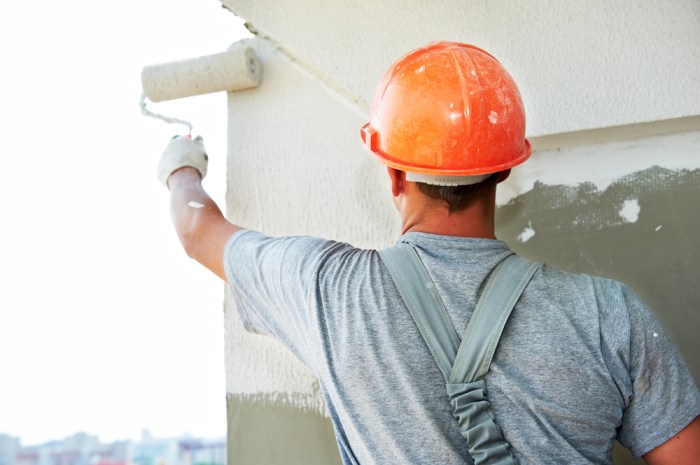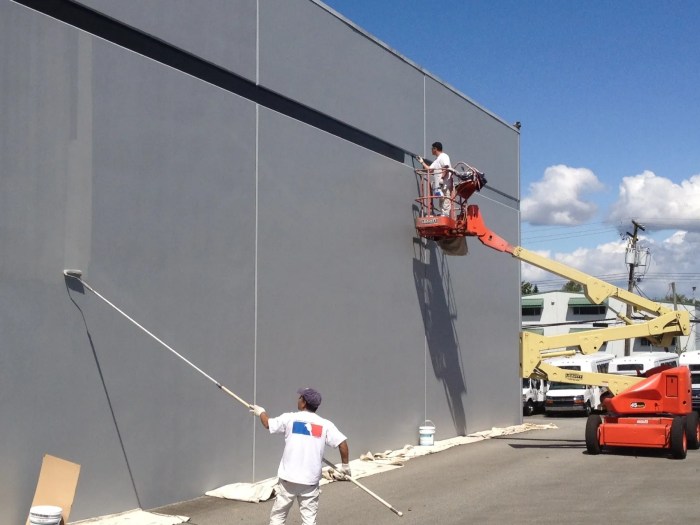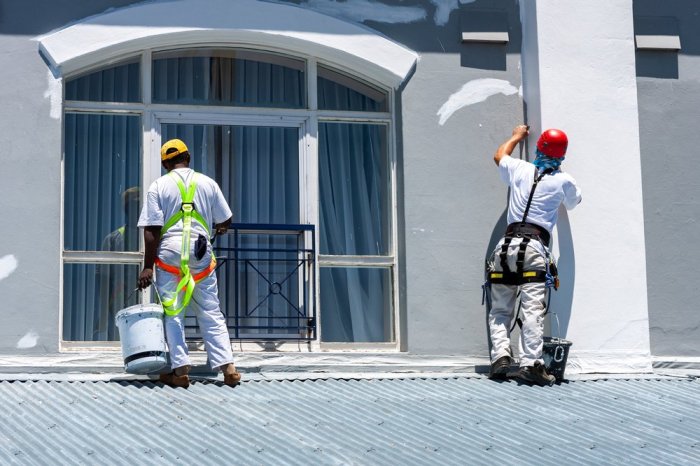Commercial painting contractors play a crucial role in the construction industry, bringing life and color to various projects with their expertise. From large-scale office buildings to intricate industrial facilities, these professionals are the artists behind the vibrant facades we see every day.
Let's delve into the realm of commercial painting contractors and uncover the secrets of their craft.
Overview of Commercial Painting Contractors
Commercial painting contractors play a crucial role in the construction industry by providing specialized painting services for commercial properties. These contractors are responsible for enhancing the aesthetics and protecting the surfaces of buildings through high-quality painting solutions.Commercial painting contractors offer a wide range of services, including interior and exterior painting, surface preparation, color consultation, protective coatings, and specialty finishes.
They work closely with clients to understand their specific needs and requirements, ensuring the final result meets their expectations.
Examples of Projects Requiring Commercial Painting Contractors
- Office Buildings: Commercial painting contractors are often hired to paint the interiors and exteriors of office buildings to create a professional and inviting atmosphere for employees and clients.
- Retail Stores: Retail establishments rely on commercial painting contractors to refresh their storefronts and interior spaces to attract customers and enhance the overall shopping experience.
- Hotels and Restaurants: Commercial painting contractors are essential for maintaining the visual appeal of hotels and restaurants by providing expert painting services that meet industry standards and regulations.
- Industrial Facilities: Industrial settings such as warehouses, factories, and manufacturing plants require specialized painting solutions to protect surfaces from corrosion, chemicals, and other environmental factors.
Qualifications and Skills

To work as a commercial painting contractor, certain qualifications and skills are essential. These include certifications, technical expertise, and the ability to manage large-scale projects efficiently.
Qualifications and Certifications
- Completion of a high school diploma or equivalent
- Apprenticeship or formal training program in painting
- Certifications in lead-based paint removal (if required)
- Knowledge of safety regulations and procedures
Essential Skills
- Attention to detail
- Excellent color vision and coordination
- Ability to work at heights and in various environments
- Strong communication and interpersonal skills
- Time management and organizational abilities
Commercial vs Residential Projects
Commercial painting projects require a different skill set compared to residential projects due to their scale and complexity. While residential projects focus more on aesthetics and personal preferences, commercial projects often involve working with architects, designers, and project managers to meet specific requirements and deadlines.
Safety Regulations and Compliance
Commercial painting contractors are required to adhere to strict safety regulations to ensure the well-being of their workers and the general public. Failure to comply with these regulations can result in accidents, injuries, and even legal consequences.
Safety Regulations for Commercial Painting Contractors
- Proper training and certification for all workers in handling hazardous materials and equipment.
- Regular safety inspections and risk assessments to identify potential hazards on job sites.
- Compliance with OSHA (Occupational Safety and Health Administration) standards for construction and painting work.
- Use of personal protective equipment (PPE) such as gloves, goggles, masks, and harnesses when working at heights.
Safety Hazards in Commercial Painting Projects
- Exposure to toxic fumes and chemicals from paint products.
- Risk of falls from ladders, scaffolding, or elevated platforms.
- Hazards related to working in confined spaces or poorly ventilated areas.
- Potential for electrical accidents when working near power sources or equipment.
Ensuring Compliance with Safety Standards
Commercial painting contractors implement various measures to ensure compliance with safety standards, such as:
- Providing comprehensive safety training to all workers before starting any project.
- Regularly updating safety protocols and procedures based on industry best practices.
- Conducting safety audits and inspections to identify and address any safety issues promptly.
- Encouraging open communication between workers to report safety concerns or incidents without fear of retaliation.
Project Estimation and Planning
Estimating costs and effectively planning projects are crucial aspects of running a successful commercial painting business. Proper project estimation ensures that resources are allocated efficiently and that the project is completed within budget and on time.
Estimating Costs for Commercial Painting Projects
When estimating costs for commercial painting projects, contractors typically consider factors such as the size of the project, the type of surface to be painted, the quality of paint to be used, and the labor required. They also take into account any additional services, such as surface preparation or repairs, that may be needed.
- Calculate the square footage of the area to be painted.
- Determine the type and quality of paint needed based on the surface material and desired finish.
- Assess the labor required for the project, including the number of painters needed and the estimated hours of work.
- Include any additional costs for materials, equipment, and overhead expenses.
Planning and Scheduling Projects Effectively
Commercial painting contractors plan and schedule projects effectively by creating detailed timelines, allocating resources efficiently, and coordinating with clients and other subcontractors. Effective planning ensures that projects are completed on time and within budget.
- Develop a project timeline with specific milestones and deadlines.
- Allocate resources such as manpower, equipment, and materials based on the project requirements.
- Coordinate with clients to ensure that their schedules and expectations are met.
- Regularly monitor progress and make adjustments as needed to stay on track.
Importance of Accurate Project Estimation
Accurate project estimation is essential for the success of a commercial painting business as it helps in managing costs, improving profitability, and maintaining client satisfaction. A well-estimated project can lead to better resource allocation, more competitive pricing, and overall project success.
“Accurate project estimation is the foundation for a successful commercial painting business.”
Types of Commercial Painting Projects

Commercial painting contractors work on a variety of projects, each with its unique challenges and considerations. Let's explore different types of commercial painting projects and specialized techniques for each.
Office Buildings
- Interior and exterior painting of office spaces
- Specialized techniques for high-rise buildings and unique architectural features
- Considerations for working during office hours to minimize disruption
Retail Spaces
- Painting storefronts, malls, and individual shops
- Use of vibrant colors and branding elements to attract customers
- Challenges of working in high-traffic areas and tight deadlines
Industrial Facilities
- Coating and painting of manufacturing plants, warehouses, and factories
- Specialized industrial coatings for protection against chemicals, heat, and corrosion
- Compliance with safety regulations and environmental considerations
Last Recap

As we conclude our exploration of commercial painting contractors, it becomes evident that their work goes beyond just painting walls – it's about transforming spaces and creating lasting impressions. With a keen eye for detail and a passion for excellence, these contractors truly leave their mark on the world of construction.
User Queries
What qualifications are needed to become a commercial painting contractor?
To work as a commercial painting contractor, individuals typically need relevant certifications or licenses, along with practical experience in the field.
How do commercial painting contractors estimate project costs?
Commercial painting contractors estimate costs by considering factors such as materials, labor, equipment, and project scope to provide accurate pricing to clients.
What safety regulations must commercial painting contractors follow?
Commercial painting contractors must adhere to safety regulations set by OSHA (Occupational Safety and Health Administration) to ensure a safe work environment for their team and clients.
What are some specialized techniques used for painting specific commercial structures?
Specialized techniques for commercial structures may include spray painting for large surfaces, epoxy coatings for industrial floors, and high-durability paints for high-traffic areas.







